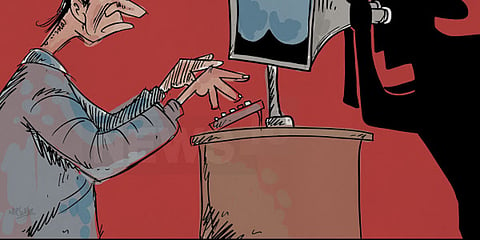

[dropcap]A[/dropcap] look at social media trends and hashtags suggests that an Orwellian state or a police state has been unleashed by Ministry of Home Affairs (MHA). The Leaflet published a legal analytical piece ringing alarm bells.
This current piece is an endeavour to examine the MHA Order dated December 20, 2018 solely from the point of view of law and understand if it poses any reasonable threat. To this end, it shall touch upon the provisions of Information Technology Act, 2000 (IT Act) and Rule 4 of Information Technology (Procedure and Safeguards for Interception, Monitoring and Decryption of Information) Rules, 2009 (IT Rules), which are of relevance in the context of MHA order.
The MHA order has been issued by Cyber and Information Security Division of the Ministry of Home Affairs. Broadly speaking, some of the responsibilities discharged by MHA are as under:
Though in terms of Entries 1 and 2 of List II – 'State List' – in the Seventh Schedule to the Constitution of India, 'public order' and 'police' are the responsibilities of States, Article 355 of the Constitution enjoins the Central Government to protect every State against external aggression and internal disturbance and to ensure that the Government of every State is carried on in accordance with the provisions of the Constitution.
In pursuance of these obligations, MHA continuously monitors the internal security situation, issues appropriate advisories, shares intelligence inputs, extends manpower and financial support, guidance and expertise to the State Governments for maintenance of security, peace and harmony without encroaching upon the constitutional rights of the States.
Upon a bare perusal of MHA order, it transpires that:
While adverting to Section 69(1) of IT Act, one is bound to observe the heading i.e., "Power to issue directions for interception or monitoring or decryption of any information through any computer resource". The language used in this heading makes it appear as though Section 69(1) of IT Act confers an indiscriminate power to issue directions for interception or monitoring or decryption of any information through any computer resource.
However, if we were to dissect Section 69(1) of IT Act, the following would emerge:
Considering the elaborate scheme of Sections 69(1) of IT Act, 69(2) of IT Act and Rule 4 of IT Rules, even a cursory glance at MHA order would reveal that, MHA order is merely an authorisation and not a direction. It follows as a logical corollary that, the 10 agencies which have been authorised, cannot, merely based on MHA order, intercept, monitor or decrypt or cause to be intercepted or monitored or decrypted any information generated, transmitted or received or stored in any computer resource; at least legally.
An endeavour to examine MHA order, solely from the point of view of law and understand if it poses any reasonable threat, would be rendered incomplete if it does not refer to Rule 3 of IT Rules.
In fact, Rule 3 of IT Rules prescribes an elaborate procedure for interception or monitoring or decryption of any information. Evidently, MHA Order is not one under Rule 3 of IT Rules.The heading of Rule 3 of IT Rules is "Directions for interception or monitoring or decryption of any information". Pertinently, Rule 3 of IT Rules, in as many words, stipulates that, no person shall carry out the interception or monitoring or decryption of any information generated, transmitted, received or stored in any computer resource under Section 69(2) of IT Act, except by an order issued by the competent authority.
However, Rule 3 of IT Rules envisages the following exceptions.
It would not be out of place to mention that, furthermore, in case of emergency:
A strict legal analysis seems to indicate that, the paranoia surrounding MHA order as to installation of an Orwellian state or a police state by MHA, seems to be premature and unfair, at least at this stage. In fact, MHA has issued a press release dated December 21, 2018, titled 'Some points on Lawful interception or monitoring or decryption of information through computer resource', wherein, MHA has spelt out the ways in which MHA order will help. IT Rules are in force since 2009. However, MHA Order has been issued only now, much against the popular opinion, which, in all likelihood, shall raise eyebrows. The same does not necessarily make MHA order bad in law, as it has been issued very much within the four corners of IT Act and IT Rules, as they stand today.
Mayank Sapra and Arjun Natarajan, are Delhi-based advocates. The views expressed in this piece are personal.
[Full Disclosure: Mayank Sapra has appeared against the Union of India and various State agencies in several matters including the challenge to the vires of the Aadhaar Act. Arjun Natarajan has been advising and representing Telecom Regulatory Authority of India, since January 2018.]